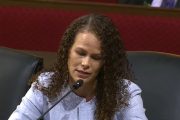
The Seattle City Council voted unanimously on Monday to approve a new gun tax and regulations on firearms and ammunition sold in the city. Despite evidence to the contrary, supporters contend the tax will serve as a deterrent to criminals interested in obtaining a firearm.
The Washington Times reports, “The legislation … implement[s] a $25 tax on firearms and a 5-cent-per-round tax on ammunition, and would force gun owners to report a lost or stolen firearm within 24 hours.”
Advocates claim the measures will curb gun violence. “Every day, the general public pays the enormous cost of gun violence,” said Council President Tim Burgess moments after the vote.
Gun violence is a public health crisis in our city and our nation. City government can and must pursue innovative gun safety measures that save lives and save money. As it has in other areas of policy, Seattle can lead the way in local solutions.
A gun violence tax will give us revenue to provide broad-based benefits through research and prevention programs. Mandatory reporting provides the police information critical to investigations. I’m grateful for my colleagues’ full support for both of these measures.
The city claims that the gun tax will generate between $300,000 and $500,000 in revenue, which it will put toward gun-violence prevention programs.
But those numbers are misleading. The Seattle Times reports that for the estimated revenue, finance officials obtained the annual number of background checks for gun sales in Washington, determined the percentage of Washington’s licensed gun dealers in Seattle, and used it to guess the number of firearms sales in the city. Critics contend that this method fails to take into account the decrease in sales or outright loss of businesses the new tax would cause.
According to Seregey Solyanik, owner of Precise Shooter in Seattle, the tax will simply divert customers to purchase their firearms and ammunition just outside of the city’s border. He states he is compelled to move. “My store will definitely have to move. It would not be economically viable to stay in the city,” he said, noting that there are many gun shops just outside the city.
Solyanik states that his store grossed $22,000 during the first six months of 2015, before expenses. If he were to pay the city’s taxes, it would cost him $23,500. He would be left with having to choose between passing the extra costs onto his customers or simply going out of business.
Solyanik is hoping, however, that it will not come to that, as gun store owners are expected to file a lawsuit against the taxes. “The very first thing that is going to happen is that all the gun stores will have to file a lawsuit trying to stay this,” Solyanik said. “So while the court considers it, the law won’t go into effect.”
In fact, Solyanik contends that the ordinance likely will not be able to withstand a legal battle. “There is a law in the state of Washington that says you cannot `[enact] more restrictions on firearms than already exist in the state,” Solyanik said. “It is extremely easy to show that the only intent with this law is not collecting the revenue, but legislating on guns, and it should be easy for a court to see that this is illegal.”
A 2008 opinion from the Washington State attorney general states that these sorts of local firearm laws are prohibited by the preemption statute.
Advocates claim that the gun violence tax would deter criminals from purchasing a gun. But as Breitbart News observes, when a similar tax was implemented in Chicago in April 2013, homicides rose in 2014 and are now higher than they were a year ago.
Months after Chicago’s “violence tax” went into effect, CBS Chicago reported that the number of homicides in Chicago for 2013 came in at 415. But in 2014, the first full calendar year after the implementation of the tax, the Chicago Tribune reported 434 deaths — a 19-death increase. Likewise, Chicago’s ABC 7 reports that in the first six months of 2015, “murders and shooting are up.”
USA Today has also reported that the homicide rate in Chicago has increase 19 percent and the number of shooting incidents rose 21 percent in the first six months of 2015.
Meanwhile, Cook County in Chicago continues to get $25 for every gun purchased by a law-abiding citizen.
Opponents observe that taxes placed on firearms create an undue burden on law-abiding and lower-income individuals. “The burden of regressive taxes like the Seattle proposal falls squarely on those that are least able to afford them,” the NRA’s lobbying arm, the Institute for Legislative Action, wrote Friday. “Persons of means will simply drive outside the city to purchase firearms and ammunition, while those without such options will be forced to go forego their rights or pay the tax. This is especially egregious considering how those at the lower end of the economic scale also tend to reside in areas where violent crime is the highest. One wonders whether this type of social engineering on the downtrodden is an intended feature of the legislation rather than an unfortunate consequence.”



